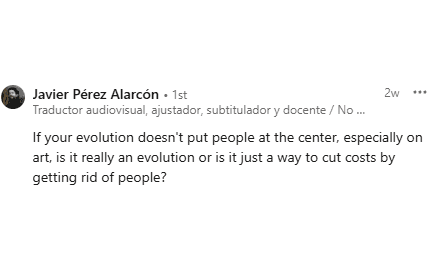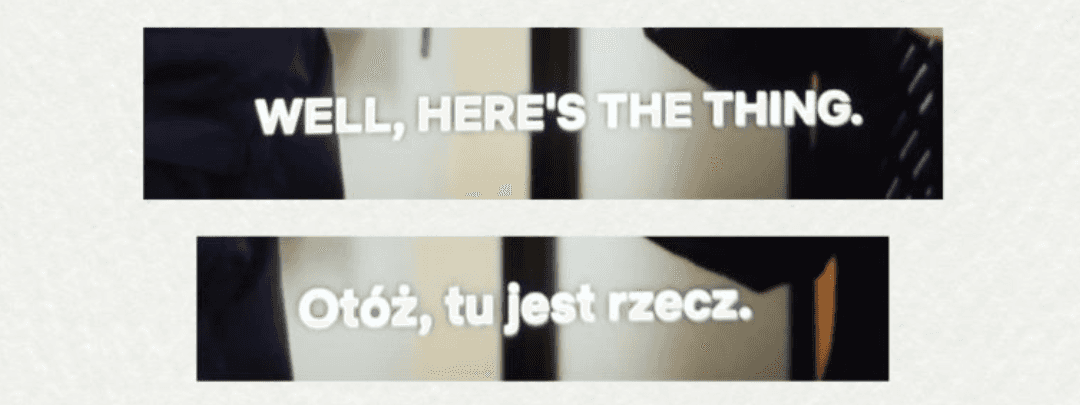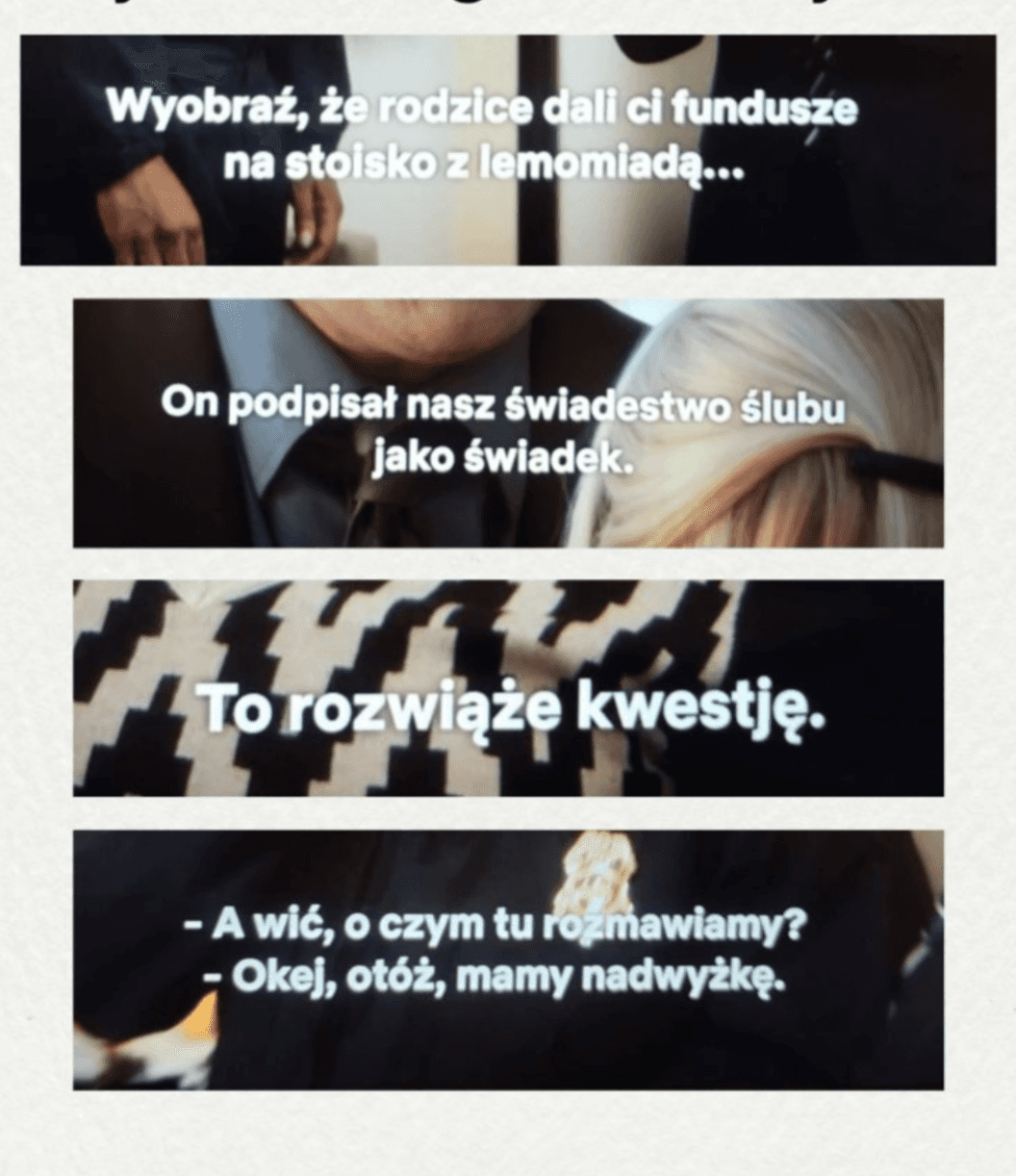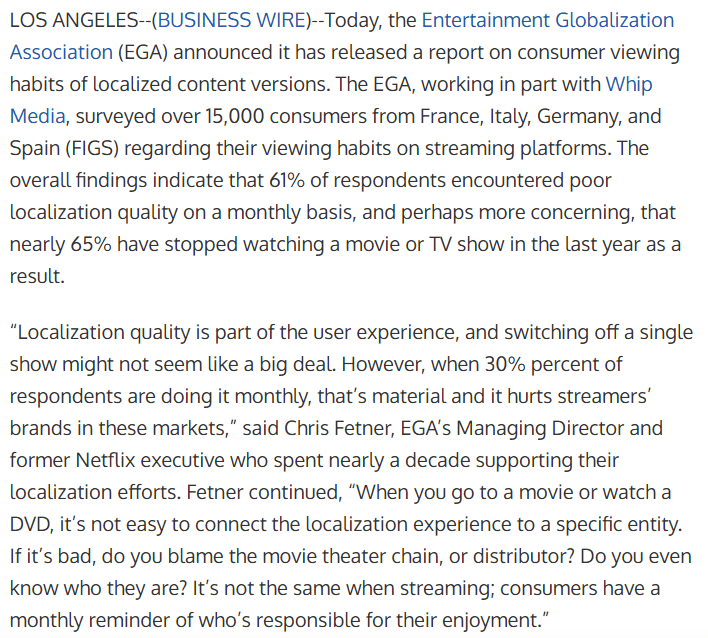Two weeks ago, Plint officially launched Plint SUB, a subtitling platform that combines AI with a fully automated SaaS delivery model, and made a bold promise of “93% MQM-verified accuracy”. It sounds like a miracle for media companies.
The problem? In the world of audiovisual translation (AVT), the promise of AI is still more hypothetical than real. For anyone who’s ever actually worked in AVT, it sounds like something else entirely: a marketing sleight of hand.
Because 93% accuracy in subtitling doesn’t mean “good enough.” It means broken translations, constant errors encountered every minute, and an audience left watching a distorted version of the show they came for.
Again and again, AI has shown that it’s simply not ready. And when companies try to deploy it at scale, the results are catastrophic .
Why AI Stumbles
The core problem is simple: AI doesn’t understand context.
It doesn’t recognize whether the speaker on screen is a man or a woman and can't adjust the translation accordingly [just watch the video below]. It can’t connect whether a line of dialogue references back to an earlier scene. It can’t hear tone or style, or recognize and convey human humor and irony.
AVT, unlike other forms of translation, requires that exact awareness of context. Audiovisual translators work with sounds, visuals, and cultural differences. Machines don’t.
Languages like Polish expose the flaws even more starkly. With seven grammatical cases and three genders, it’s notoriously difficult. Errors in AI output are glaring. And because languages like Polish are considered “niche”, there’s little commercial incentive to invest and improve that.
Even if those models could somehow "translate" a show into several languages without making mistakes every other sentence (which they can't, because of the peak AI, which I will cover further), they don't really “know” other cultures. Which is something a good localizer must always take into account. Let's take humor, for example. A joke that works in English may fall flat in a completely different language. Or worse, it could be offensive. Good translator knows that and adapts. We're not machines, translating literally.
AVT isn’t just text, it’s human culture
Yes, maybe AI can churn out corporate videos that nobody watches anyway. You know, the kind of “message received and forgotten” PR-content (as Don Draper once joked about in Mad Men).
However, AVT I do deals with creative works which strive to be unique and original. And their translations should be original and unique too.
But generative AI and LLM solutions don't come up with anything original by itself. Instead, it re-uses existing (often copyrighted) materials, making original artistic work less original. All this goes against the best interests and intentions of the original authors.
I understand the efficiency gains from automating some technical processes, but translation is in a completely different animal. There's a fundamental difference between automating timecodes, improving file management, etc., and automating art, language and culture. In this regard AI is not a natural or inevitable evolution.
The people who oppose tools like this are not technophobes; we just know what translation entails and are critical of treating cultural work as just another technical process to optimize.
-Cristina Vidal SalesAudiovisual translator and accessibility expert
The illusion of 93%
Let’s break down Plint’s much-touted “93% MQM accuracy.”
At face value, that claim means a 7% error rate (I know MQMs are more complex, but let's simplify for the sake of this food-for-thought-excercise).
Now translate that into what it means for an audience:
An average 40-minute series episode has about 550 subtitle lines.
7% of 550 is roughly 38–40 lines with errors per episode.
That works out to about one wrong subtitle every minute.
These errors can be mistranslations, awkward grammar, broken style, or missed nuance. For fast-paced genres like shows, anime or action-movies (so majority of modern productions) this level of disruption becomes constant and jarring.
And it's FAR from professional human standards, where the expectation is maybe 1–2 minor slips per episode, max.
And this is assuming their 93% figure is true. In reality, it’s too "good" to be true. According to researchers, machine-translated subtitles, even after post-editing by humans, have been shown to contain seven times more errors than human translations. Current AI peaks at around 85% accuracy, which translates to an error in every eighth sentence.
Losing the Human safety net
The problem runs deeper though. The only way to maintain even the lowest quality of AI translation models is by training it on human editing and human translations. What is the risk of eliminating human translations and ending translation as a human profession? First, we lose the humans who know how to translate, and, eventually, we will lose the language models.
Also, you always need a perspective of a second human, especially in creative translations. The absence of a second human eye makes errors much harder to catch. A good reviewer plays a crucial role in questioning and verifying choices that might otherwise slip through unnoticed.
Since editing machine-translated text sometimes involves heavy rewriting to ensure naturalness and fluency, these revisions can introduce new errors, especially when made by a machine too. And without a second person reviewing these changes, the risk of overlooking mistakes increases significantly.
As a result, quality drops even faster.
So the industry isn’t just losing jobs and quality. It’s losing trust and sustainability. And that’s the real cost.
The race to the bottom
If this feels familiar, it’s because the slide started years ago.
Let’s be honest. We all know language service providers and streaming platforms have been cutting corners on translations for years. It didn’t start with AI but when they began outsourcing to the cheapest subcontractors, splitting seasons between multiple translators, accepting machine-like results, and letting typos, grammar issues, and broken translations into the final product. AI is just the next step in that race to the bottom.
You want examples, check out this post or just look at the screenshots below:
Basic grammar errors, clumsy literal translations, even nonexistent words. Yet nobody at the top cared enough to fix them. Episodes are clearly rushed or handed to someone without the skills. The system was never about quality, but volume and cost.
For years agencies and streaming services tolerated (or actively chosen) equally bad human translation at bargain rates. The real problem is the viewer loses, the creative team’s work gets distorted and localization becomes a barrier, not a bridge.
This is a form of cultural exclusion. Why should a Polish or Spanish viewer get a sloppy, half-baked version of a show others get to enjoy in full fidelity in original? There’s no good reason. Just corporate greed, and disrespect for the audience. The bad quality is more evident then ever.
And viewers DO notice and they vote with their money. Every botched line is a reminder that the product they’re watching is a degraded version of the original. It's important because Entertainment Gobalization Association run by Chris Fetner (formerly of Netflix) have published a research, which their director very aplty commented:
Translation makes up a tiny portion of the movie production budget, so it's weird that there's so much cost-cutting happening for a thing that's so customer-facing.
Filmmakers left in the blind
Do filmmakers and showrunners even realize what's happening with their work?
Actors build careers on these shows, risking their carefully crafted image. Directors agonize over every shot and creative decision. Scriptwriters pour their hearts and souls into writing stories. Do you think they know their beloved work is being put through a machine, abused and distorted in translation? I recall there were strikes about this a couple of years ago.
I doubt actors are fine with this. Keanu Reeves actually actively BANS it on his contract:
https://variety.com/2023/film/news/keanu-reeves-slams-deepfakes-film-contract-prevents-digital-edits-1235523698
There are legal stakes to this too. Under the current law:
The use of copyrighted materials to train #AI is not “fair use” under the law.
Only humans can be recognized as authors. AI creations belong to the public domain.
In Poland, ZAiKS (the authors’ association) has already blocked AI training on its members’ works.
If AI output resembles existing works too closely, that can constitute rights violations.
Recent rulings back this up. The U.S. Copyright Office reaffirmed that AI training on copyrighted works isn’t fair use. Denmark ruled that machine translation (even post-edited bu humans) isn’t legally protected as “translation.” And in Poland, the authors’ association ZAiKS has already opted out of allowing their works to be mined for AI training.
The law is catching up (albeit slowly) but creators should be paying attention now.
A better path
So where do we go from here? There are alternatives. I have a few recommendations for clients.
Our real clients, meaning studios, creators, producers and publishers (not agencies) can:
Demand transparency: Stay curious about who actually translates your title. Ask for the translators’ names and credentials and request they be included in the credits.
Opt for direct collaboration: Even better, try to work directly with translators, you know, the people who actually translate for you. Consider using specialist independent localization companies or freelancers. Hiring a small team of pros responsible for directly handling your watching experience in different markets is the way to a top quality end product.
You can still have them work through the agency and tools of your choice but they should be treated as client-translators who work for YOU not agency-translators who they can exploit behind the curtains.Limit the use of AI: Even if you decide to go with the agency, tell them straight away that you want human translators, and not machine translation.
Your writers and devs you pour your hearts and souls into writing these stories, and it's probably just as important to you to have it localized by a human who cares.Enforce fair treatment: Just make sure your translators are paid fairly and timely and their working conditions are respected (no expectation to work weekends or bank-holiday - we deserve free days just like everyobody else - or to do a rush jobs, without proper compensation).
After all, this is our profession and livelihood, and the quality of work depends on it.
Protect your rights. Check to make sure the agency will not use your scripts to train their machine or AI translation software.
Be aware, even if you do not request machine translation they may still feed your work to their model without your consent.




